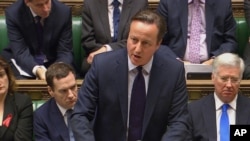British lawmakers engaged in a contentious debate Wednesday over Prime Minister David Cameron’s call to send the country's fighter jets on bombing runs against Islamic State militants in Syria.
"These terrorists are plotting to kill us and radicalize our children right now," Cameron told the House of Commons.
"The threat is very real," he said. "The action we propose is legal, it is necessary and it is the right thing to do to keep our country safe."
But Labor leader Jeremy Corbyn said Cameron's plan creates "the danger of a serious escalation" of British military involvement in the Middle East, by extending London's aerial bombardment against Islamic State targets beyond Iraq, where it has been launching attacks for a year.
Corbyn called Cameron's Syrian military proposal an "ill-thought-out rush to war. He's failed to make a case for another bombing run."
Cameron and Corbyn voiced their opinions to typically raucous cheers and jeers from British lawmakers at the start of what was expected to be 10 hours of debate ahead of a Wednesday evening vote. Analysts are predicting the parliament will approve Cameron's plan, especially since Labor is letting its members vote freely, despite Corbyn's anti-war stance.
WATCH: PM David Cameron spars with lawmakers in parliament
Several dozen Labor members could end up supporting Cameron's call for the new bombing attacks.
If Cameron's plan is approved, British officials say the bombing runs could start within hours, launched from an air base in Cyprus.
Just as the debate started, Labor lawmakers demanded Cameron apologize for telling fellow Conservative lawmakers at a private meeting Tuesday to not vote with "a bunch of terrorist sympathizers" against the bombing escalation. He did not apologize, but said he respected those who disagree with his plan.
The British public, with memories of the country's unpopular ground wars in Afghanistan and Iraq, appears to be wary of escalating the country's bombing attacks into Syria. A poll conducted by online research firm YouGov shows that British citizens’ support for military action in Syria has fallen to the lowest level since September 2014, with 48 percent of respondents supporting strikes on Tuesday, compared to 59 percent last week.
Corbyn accused Cameron of demanding a vote on his bombing plan before public support erodes further.
The British leader said his new call to arms is different than the country's previous involvement in the Middle East.
"This is not 2003," he said. "We must not use past mistakes as an excuse for indifference or inaction."
He said in the wake of Islamic State terrorist attacks in Beirut and Paris, Britain needs to stand with its French and American allies in carrying out the attacks on the Islamic State strongholds in northern Syria.
"The question is this," Cameron said, "do we work with our allies to degrade and destroy this threat and do we go after these terrorists in their heartlands from where they are plotting to kill British people, or do we sit back and wait for them?"














